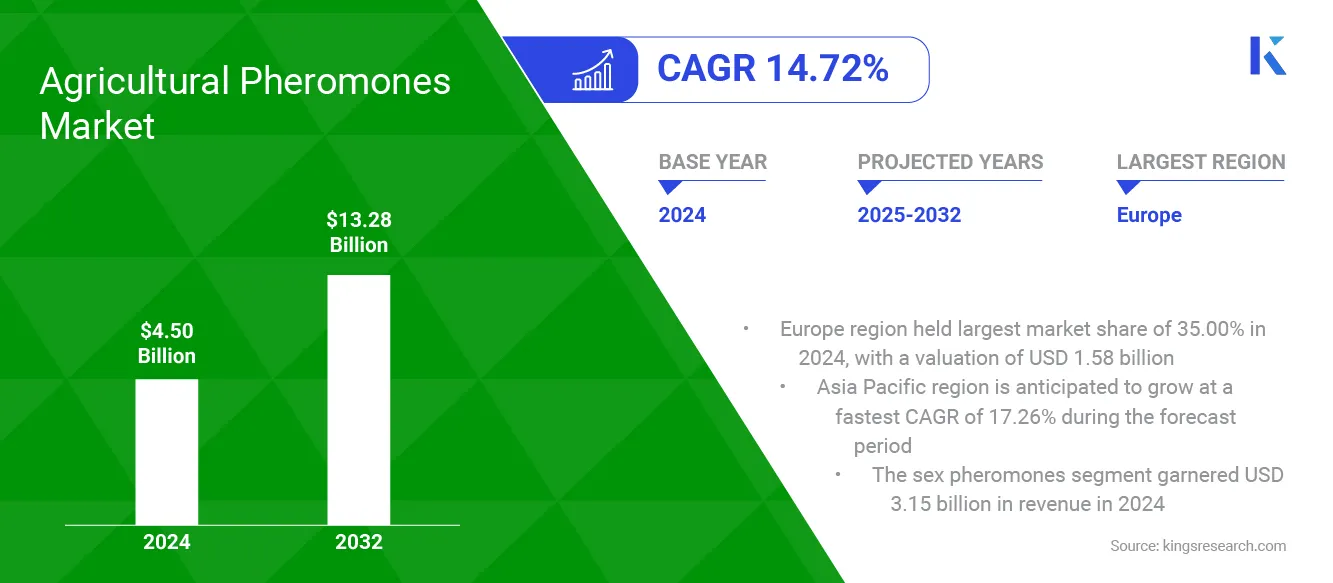Modern agriculture is becoming increasingly reliant on a consistent supply of synthetic inputs as a result of the advent of green revolution technologies. The productivity of farm commodities has increased significantly as a result of intensive agriculture and the extensive use of chemical fertilizers, but there is no denying that these fertilizers have negative effects on soil structure, microflora, water quality, food, and fodder. In this crucial phase, biofertilizers are valuable additions to chemical fertilizers.
Biofertilizers are organic fertilizers that are natural and serve to maintain the soil's healthy balance of nutrients and living microorganisms for the benefit of the plants. It is utilized in farming that is non-polluting, organic, sustainable, and green. Being a more affordable and sustainable alternative to chemical fertilizers for sustainable agriculture, it is also one of the crucial elements of integrated nutrient management. Biofertilizers are meant to supplement and, if necessary, take the place of traditional chemical fertilizers. This will enable their users to be reduced, which will have positive effects on the economy and the environment.
Make Your Plants Bloom Brighter and Healthier With Biofertilizers
Biofertilizers are products that contain microorganisms that boost plant growth, to put it simply. Despite their name and classification, these products are not fertilizers in the typical sense.
While both fertilizers and biofertilizers are input products intended to enhance plant growth and development, there is a distinction in how they do so. By adding more nutrients to the soil or the plant, fertilizers directly promote the growth and development of plants.
Biofertilizers, on the other hand, indirectly improve plant growth and development by harnessing microorganisms to speed up natural soil processes that have an impact on plant growth. Various bacteria encourage different biological processes in the soil. Also, understanding the many types of biofertilizers can assist growers in selecting the optimum solution for their crops as different bacteria may act differently depending on the environment.
Which Type of Biofertilizer is Best For Your Garden’s Growth and Prosperity?
The numerous kinds of biofertilizers that support the plant's growth at various stages of its development include:
-
Nitrogen-fixing biofertilizers (Nostoc, Azotobacter, Azospirillum, Rhizobium)
Increase the level ii of nitrogen in the soil. Fix atmospheric nitrogen in the soil so that it is available to plants.
-
Phosphate biofertilizers
Phosphorous solubilizing biofertilizers (Species of Pseudomonas, Bacillus, Aspergillus, and Penicillium)
Release insoluble phosphorus from organic and inorganic phosphate sources, allow it to fix in clay minerals, secrete organic acids, and reduce the pH to allow bound phosphates in the soil to be dissolved.
-
Phosphorus mobilizing biofertilizers (AM fungi, Arbuscular Mycorrhiza)
Arbuscles absorb these nutrients into the root system once the fungus penetrates the cortical cells of the roots and increases their surface area. It also disrupts the equilibrium of phosphate ions' absorption, which enhances the transfer of P ions.
-
Biofertilizers for micro-nutrients (Bacillus sp.)
Bacterial species operate as zinc and silicate solubilizers degrade aluminum and silicates in soil, and aid in the weathering of silicate.
- Compost (Cellulolytic fungi, Azotobacter)
Use animal dung to nourish the soil with microorganisms, an environmentally beneficial organic fertilizer that breaks down organic matter (dead plants, farmyard waste, cattle waste) and contains nitrogen, phosphate-solubilizing bacteria, and other decomposing fungi.
Unpacking the Benefits of Biofertilizers
Biofertilizers' main advantage is that they promote soil health, as opposed to traditional bulk fertilizers, which, despite containing naturally occurring minerals such as phosphorus and nitrogen, may overload the soil's ecosystem and create a chemical imbalance and toxicity.
Biofertilizers can be applied just as easily as chemical fertilizers, but their development requires advanced science.
The European Biomass Industry Association (EUBIA) states that "Very often, microorganisms are not as efficient in nature surroundings as one would expect them to be," and as a result, "artificially multiplied cultures of efficiently selected microorganisms play a vital role in accelerating the microbial processes in soil."
Increase Crop Yields
Unlike traditional chemical fertilizers, biofertilizers essentially increase agricultural yields and promote plant development. Biofertilizers, however, improve soil health while increasing crop yields since they use organic material.
User-Friendly and Easily Accessible Materials
For farmers looking for economical ways to maintain their land and crop productivity, biofertilizers are an excellent choice. With this organic product, low-income farmers can maintain perfect crop production.
Enhances a Plant’s Resistance Against Abiotic Stress
Biofertilizers have components that help a plant resist restrictive environmental factors such as drought, extreme cold, water surplus or shortage, and high salt soil. In spite of harsh climates or adverse weather, plants are more likely to sustain an appropriate growth rate as biofertilizers strengthen their resistance to abiotic stress.
Suitable Replacement for Chemical Fertilizers
Biofertilizers use compounds that are beneficial for the long-term health of the soil and plants. Chemical fertilizer provides harmful risks to the environment, consumers, and the overall health of plants without the right handling and awareness of such products once the chemically fertilized plant is harvested.
Great Substitute for Other Input Materials
Biofertilizers are all-natural options for promoting plant development, eradicating pathogens, and controlling pests. Biofertilizers essentially reduce the need for traditional fertilizers and pesticides, which are not good for long-term plant health as they contain synthetic components.
Sustainable Biofertilizer Production
By-products of using biogas to generate electricity include biofertilizers. Biogas generators use organic matter, such as animal waste or specific crops, as a renewable source of energy. The residual matter may be used as biofertilizers once the biofuel has been completely consumed by these machines to produce biogas, effectively creating a sustainable practice.
Can Biofertilizers Revolutionalize Organic Farming Practices and Promote Sustainable Agriculture?
The purpose of biofertilizers is to improve agriculture's efficiency and sustainability. These products are composed of organic matter, which supports the idea that avoiding synthetic and chemical additions can improve farming methods.
Biofertilizers use materials and microorganisms that encourage the soil's natural processes. Plant development and growth are impacted by these processes. Hence, biofertilizers enhance biological processes through microorganisms, which in turn indirectly improves plant development. By adding more nutrients to the soil or plant, fertilizers, in contrast, directly aid in the growth of crops.
In the meantime, biofertilizers utilize the earth's pre-existing microbes to enhance a plant's nutrient intake.
The effects of various microbes on plant absorption vary. For instance, nitrogen-fixing bacteria found in biofertilizers influence growth by promoting the nitrogen cycle. Nitrogen is a crucial element for the development of plants. In order to improve the environment for a plant's growth, the number of nitrogen-fixing bacteria in the rhizosphere should be increased.
Irrespective obvious benefits of biofertilizers for organic farming, these products have certain disadvantages. The availability of biofertilizers is one of these disadvantages. The demand for biofertilizers is significant and is growing, but the supply cannot keep up.
The demand for more advanced biofertilizers is critical to altering agriculture in a way that is sustainable for a changing climate, growing global population, and enhancing farming efficiency and sustainability. Thus, biofertilizers are fantastic tools for supporting organic farming. Instead of relying on potentially hazardous synthetic and chemical compounds, these solutions stimulate plant development using natural processes and organic components.




